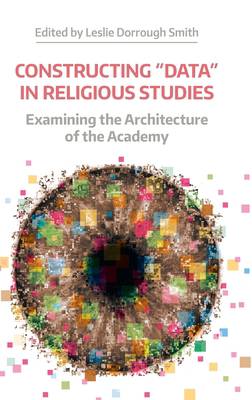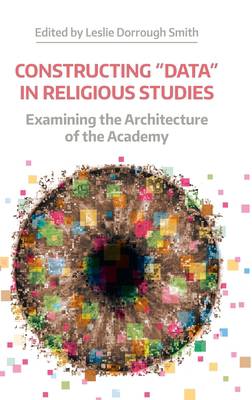
- Afhalen na 1 uur in een winkel met voorraad
- Gratis thuislevering in België vanaf € 30
- Ruim aanbod met 7 miljoen producten
- Afhalen na 1 uur in een winkel met voorraad
- Gratis thuislevering in België vanaf € 30
- Ruim aanbod met 7 miljoen producten
Zoeken
Constructing 'Data' in Religious Studies
Examining the Architecture of the Academy
€ 161,45
+ 322 punten
Omschrijving
Constructing "Data" in Religious Studies provides a critical introduction to the ways in which the category "data" is understood, produced, and deployed in the discipline of religious studies. The volume is organized into four different sections, entitled "Subjects," "Objects," "Scholars," and "Institutions," with an epilogue by Russell McCutcheon and Aaron Hughes. The volume's aim is to reflect, first, on the problems, strategies, and political structures through which scholars identify (and therefore create) data, and second, on the institutions, extensions, and applications of that data. The first three sections are spearheaded by a key essay and followed by four responses, all of which consider how the politics of the academy determine the very nature of the things we purport to study. The fourth section considers what these concepts look like as they are applied and further institutionalized in college and university structures, and itself includes four essays on "teaching," "departments," "research," and "labor." Finally, the epilogue closes the volume with a consideration on the politics of scholarly collegiality, transforming the data-makers (scholars) into data themselves.
Specificaties
Betrokkenen
- Uitgeverij:
Inhoud
- Aantal bladzijden:
- 310
- Taal:
- Engels
- Reeks:
Eigenschappen
- Productcode (EAN):
- 9781781796757
- Verschijningsdatum:
- 1/10/2019
- Uitvoering:
- Hardcover
- Formaat:
- Genaaid
- Afmetingen:
- 156 mm x 234 mm
- Gewicht:
- 612 g

Alleen bij Standaard Boekhandel
+ 322 punten op je klantenkaart van Standaard Boekhandel
Beoordelingen
We publiceren alleen reviews die voldoen aan de voorwaarden voor reviews. Bekijk onze voorwaarden voor reviews.










